
What’s your sleep type? Learn it and get better Zzz's.
Why is it that some people can run a 5k and finish their taxes before 8am? Or sit down to a four course meal at 10 PM? It all depends on your chronotype, a term used to describe your personal circadian rhythm, or internal clock. Depending on your chronotype, there will be times when you’re naturally sleepier and times you’re more awake. It’s written into your DNA, so it’s hard to change, but identifying it can go a long way in helping you create habits and routines to get the rest you need. Take our quiz to get a read on your type!
How would you describe your relationship with sleep?
Do you usually have a hard time falling asleep by 10pm?
How do you feel when your alarm goes off in the morning?
When do you find that you're most productive?
Let's talk parties. Are you Irish Exiting or staying up 'til dawn?
What's your email?
Before we share your results here, we'll also email them so you can review whenever you want.
You'll also receive updates from Loftie.
${errors.email}

The Lion: Early to bed, early to rise
You’re up at the crack of dawn, ready to take on the day. But you might also find yourself letting out a big cat yawn in the late afternoon. Take advantage of your morning energy, but be aware that nightlife might be tricky to keep up with.

The Bear: Wakes up easily with the sun
Congratulations, you’re normal! Bears make up the (Ursa) Major-ity of the population. Luckily much of society is structured around a Bear’s schedule – getting started when the sun comes up, and winding down at sunset.
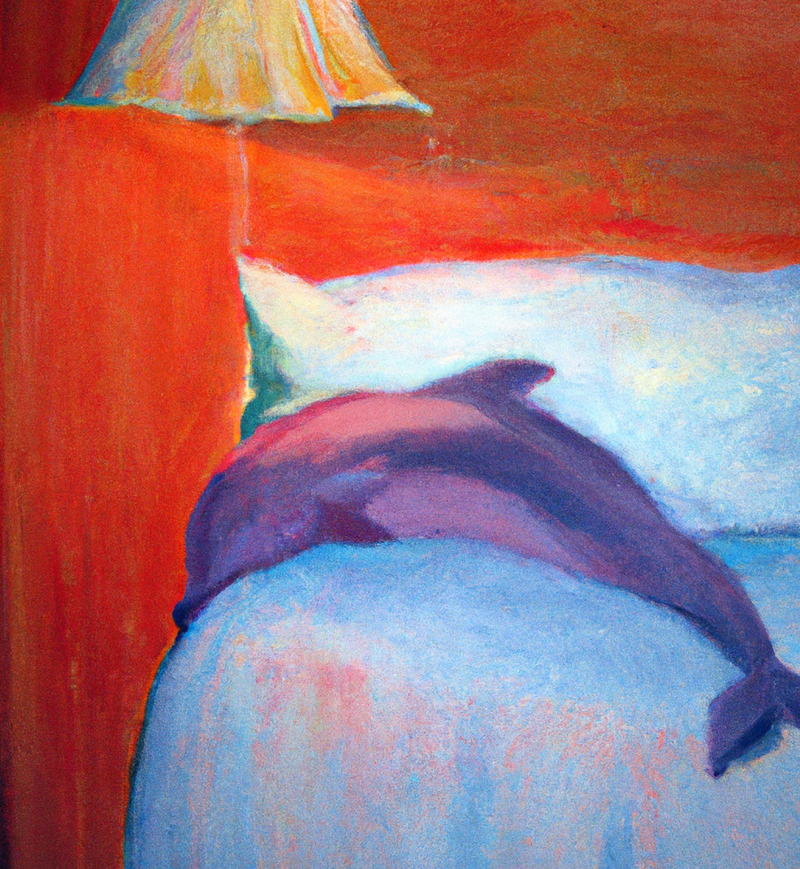
The Dolphin: Sensitive sleeper
Did you know that dolphins in the ocean only sleep with half of their brains at a time. Sound familiar? Dolphins are creative, intelligent, and prone to bursts of energy, but they can have a tough time getting enough sleep. Your body’s sleep schedule might not be as regular as the other chronotypes. That’s okay, but make sure you’re still fitting in enough time for sleep.

The Wolf: Not a morning person
It’s 10pm. Who’s up for a jog through the woods to go howl at the moon? Wolves are night people, plain and simple. Great for your social life, not so great for the next morning.
Sleep Tips
Plan to get your to-do list done earlier in the day, when you’re at your best focus. Afternoon is for lounging around on the savannah.
Eat an early dinner, whether it’s pizza or an elk carcass, so that you’re not still digesting at bedtime.
Be aware that you might start crashing if you make late social plans. Try to avoid late night coffee or stimulants as they’ll hurt your sleep.
Sleep Tips
Take a tip from your friend Goldilocks: Keep your schedule not too early, and not too late.
Plan your meals around when you’re productive. You’ll get most of your work done in the morning and early afternoon. Plan for a dip in energy mid-day.
Most schedules are going to be structured around your natural rhythm, so try to be understanding when you encounter a Wolf or a Lion, who will be on later or earlier cycles, respectively.
Sleep Tips
Dolphins typically get their best work done in the late morning, so plan to schedule around that.
Don’t be afraid to take a break or even a nap during the day when you’re feeling drained.
Dolphins can get woken up easily by little distractions, like sounds, phones, or Great White sharks – so make your sleeping space as peaceful as possible.
Sleep Tips
You love to sleep in – so plan your day without that 8am meeting if at all possible.
Wolves are typically more productive in the later afternoon or evening, when all the other woodland critters are winding down. Those…tasty…critters…
You’re going to be going against the grain with most of the other chronotypes, who are generally productive in the morning. See if you can get work done the evening before, when you’re at your best.
The Best Features For You
Waking up might not be an issue for you, but it’s important to make sure you are getting to bed early enough that you’re getting enough hours of sleep.
The Loftie Clock features a “Bed Signal” to remind you when it’s time to unwind for bed. Set yourself up for your mightiest morning by solidifying a strong nighttime routine.
The Loftie Lamp also has a wind down feature that uses fading red light to signal to your body it’s time to sleep.
Gradual wakeups are ideal for any chronotype. The Loftie Clock’s two-phase alarm system is great for keeping your sleep schedule regulated and avoiding jarring wake ups. Nobody likes a cranky bear.
Consistency is key with all chronotypes, but especially with bears. Not too hot, not too cold. Juuuust right. The Loftie Lamp’s bed signal and wind-down mode are perfect for reminding you that it’s time to start winding down for your nightly hibernation.
The Loftie Clock comes with a large library of soothing content. The meditations or breathwork can be very helpful for calming a racing mind before bed.
The Loftie Lamp also has a wind down feature that uses red light, which helps the body generate melatonin, a hormone that makes you feel sleepy.
If work and other obligations allow, give yourself time to sleep a little later. If not, you can make mornings a little easier with Loftie’s gentle two-phase alarm system. First you’ll hear the softer wake-up tone to slowly bring you into consciousness. Nine minutes later, you’ll hear the get-up tone, a more melodic and percussive tone designed to help you get up out of bed.
Just because you like to stay up late doesn’t mean you don’t need sleep. Make sure if you have to wake up early, you’re still getting to bed at a reasonable time. A great way to do this? Try exposing yourself to red light before bed, like the kind made by the Loftie Lamp’s night mode. Red light helps the body generate melatonin, a hormone that makes you feel sleepy.
Friendly reminder that this is not medical advice. We’re not doctors or scientists, just total sleep nerds. These results are meant to be a starting point, not a diagnosis. If you’re interested in learning more, or if you’re having chronic sleep issues, we recommend talking to your doctor.
Rest, Relax, and Recharge with Loftie Rest

Loftie+ Content Library
Listen to your Loftie audio anywhere, anytime with the Loftie app. Regular releases expand the library with classic books, meditations, educational pieces, poetry, ASMR, exclusive partnerships, and more.
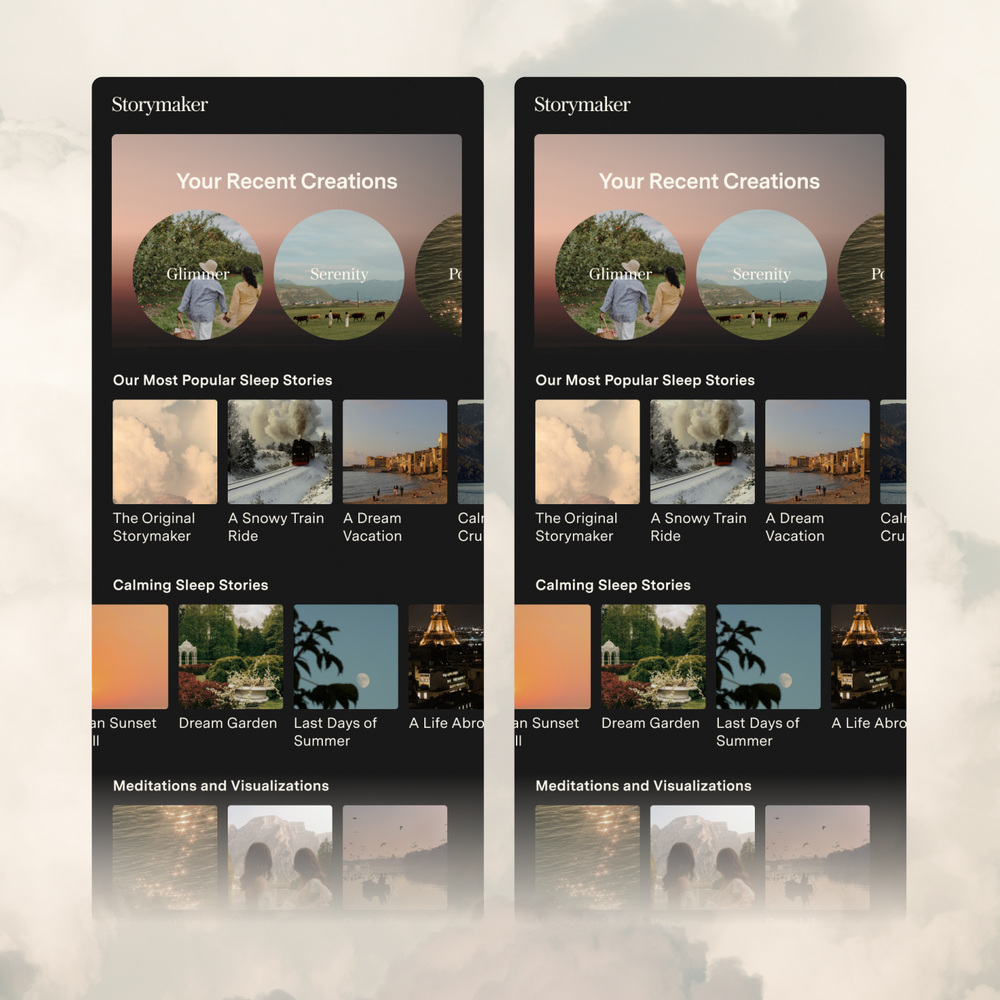
Storymaker
Create personalized audio content to include your name and favorite things. Make as many as you wish. Every track you make saves in your app and clock so you can listen again.
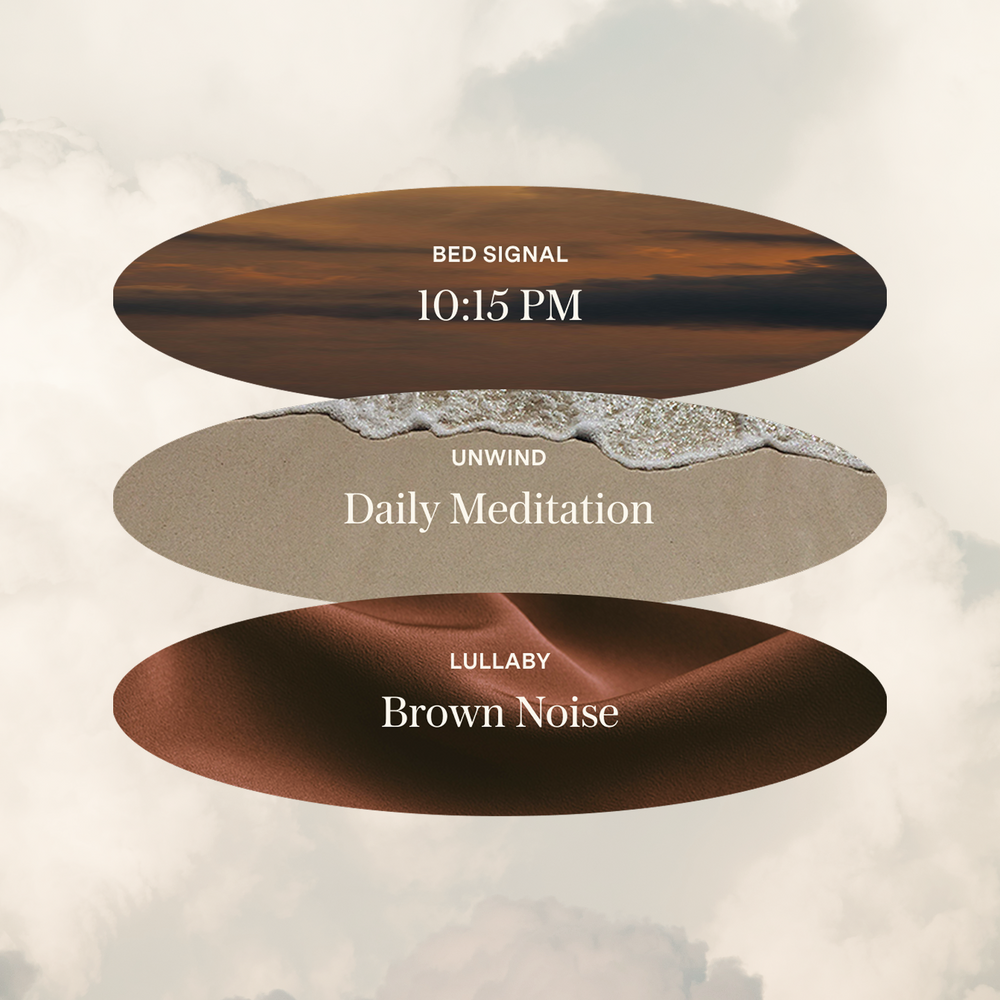
Wind Down Routines
Create a consistent routine by customizing and automating your favorite Loftie tracks to play before bed. When you want and for however long you want.
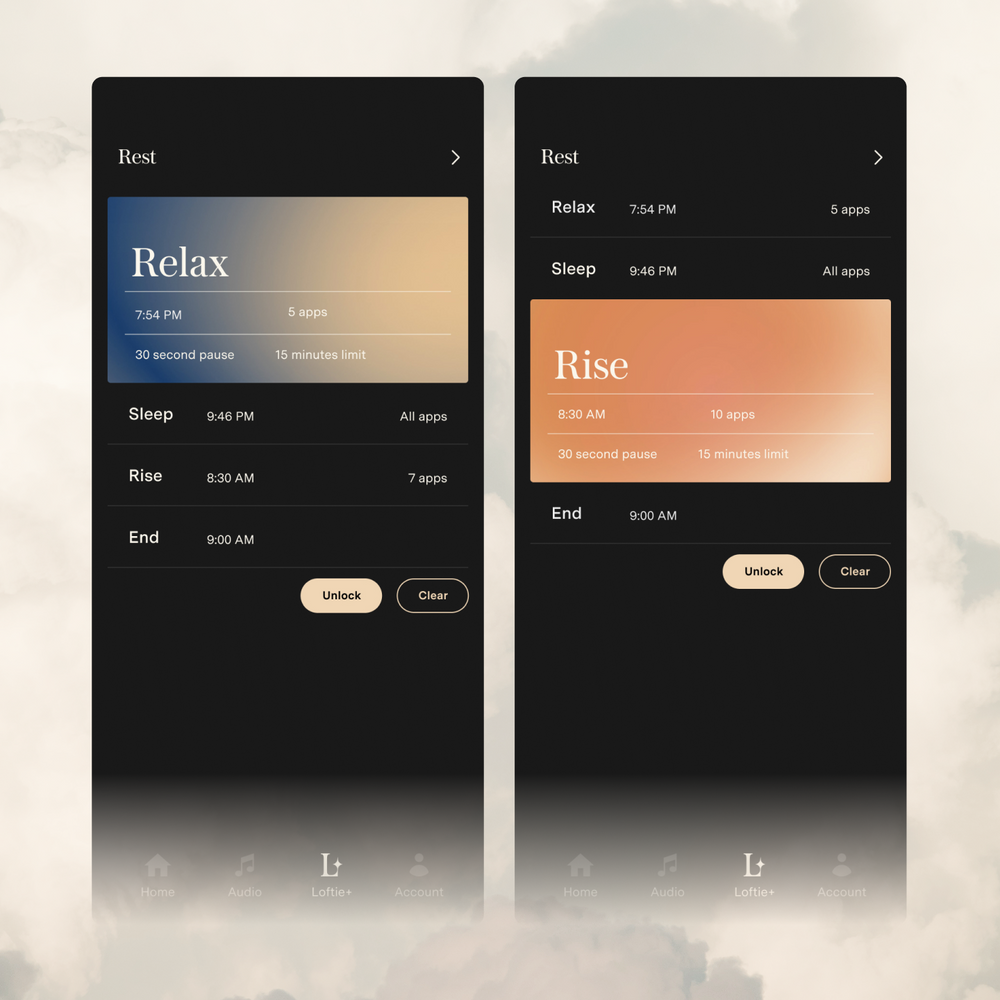
Rest
Ditch the doomscroll! Rest is a four part sequence of app blocking designed to help reduce screen time at the start and end of your day, allowing your brain and body to transition into and out of sleep.
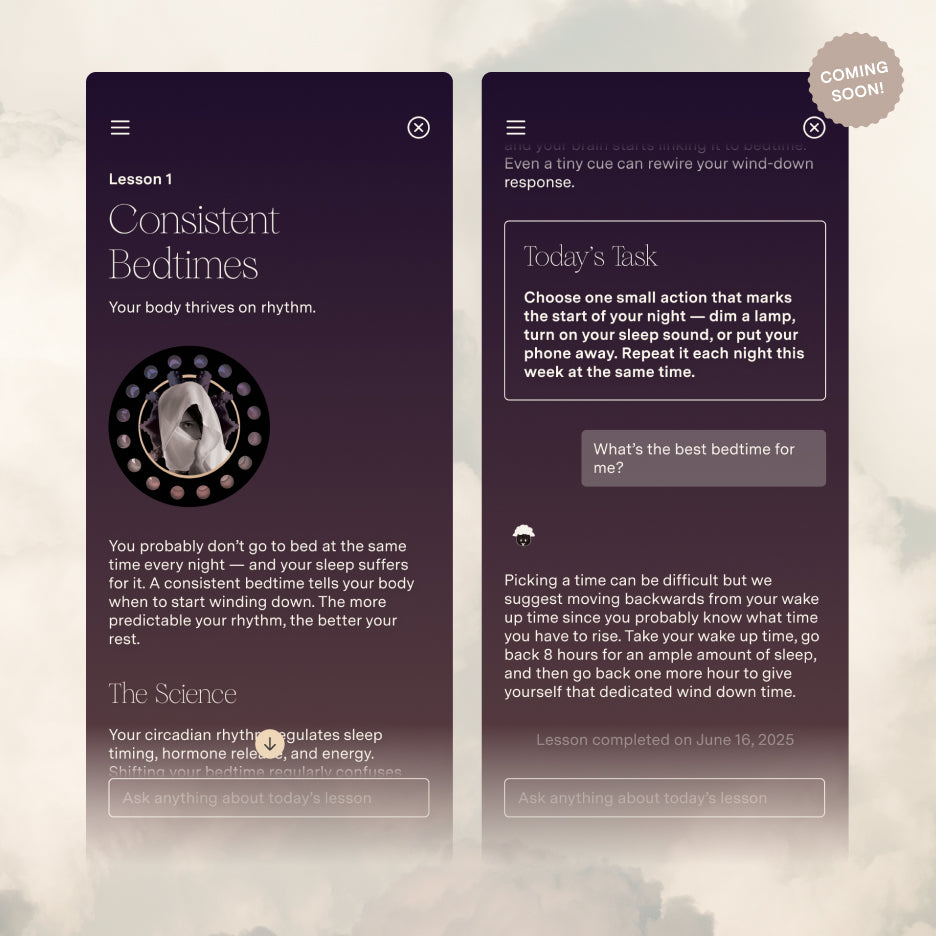
Night School and Sleep Coach
A six-part sleep course rooted in science that provides you education and bitesized lifestyle changes for better rest and an AI-powered coach to support your on your journey to better sleep.
Loftie+ Content Library
Listen to your Loftie audio anywhere, anytime with the Loftie app. Regular releases expand the library with classic books, meditations, educational pieces, poetry, ASMR, exclusive partnerships, and more.
Storymaker
Create personalized audio content to include your name and favorite things. Make as many as you wish. Every track you make saves in your app and clock so you can listen again.
Wind Down Routines
Create a consistent routine by customizing and automating your favorite Loftie tracks to play before bed. When you want and for however long you want.
Rest
Ditch the doomscroll! Rest is a four part sequence of app blocking designed to help reduce screen time at the start and end of your day, allowing your brain and body to transition into and out of sleep.
Night School and Sleep Coach
A six-part sleep course rooted in science that provides you education and bitesized lifestyle changes for better rest and an AI-powered coach to support your on your journey to better sleep.






